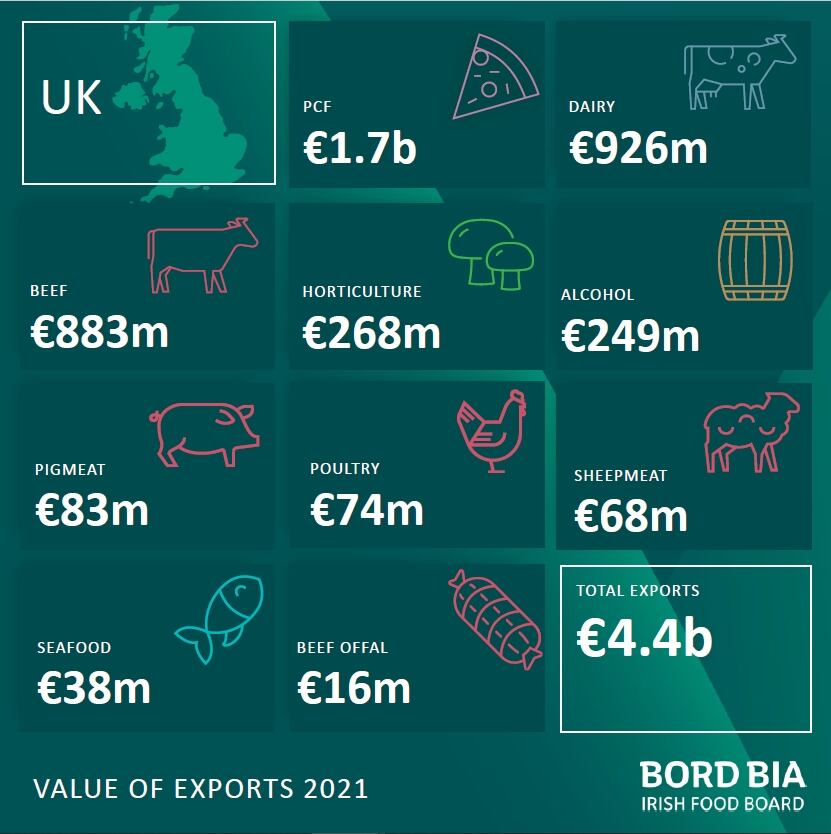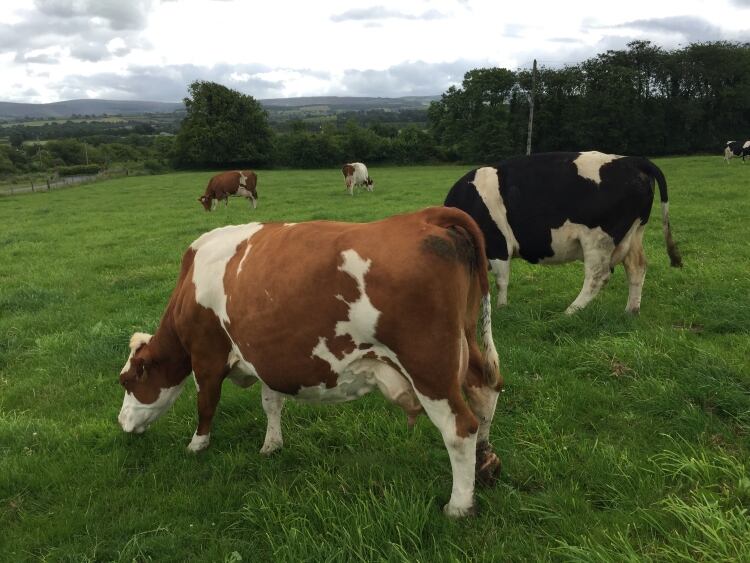Ireland exports about 90% of its food and drink production. Given the ongoing Covid-19 pandemic and the fact that the UK is now operating outside of the EU Customs Union, the performance of the Irish export sector was robust in 2021.
Bord Bia has also published new three-year targets to further contribute to the growth in the value-chain of Irish food and drink exports as part of the launch of its new 10-year Statement of Strategy. The plan envisages a significant expansion in the value growth of Irish food and drinks exports during the period, including an 11% increase in the value of dairy, meat and livestock exports, and a 14% jump in prepared consumer food exports.
The UK remains a primary export market for Ireland. In 2021, 33% of Ireland’s total food and drink exports were destined for the UK, with 34% headed for international markets outside the UK and EU, and 33% for the EU.
Two-thirds of Prepared Consumer Foods (PCF) are exported to the UK and experienced a 1% increase to €1.7bn ($1.95bn) in 2021.
Global growth for Irish dairy continued, and exports to the UK increased by 1% to €926m ($1.06bn). This performance is positive given the record volumes of product, 460,000 tonnes, moved into the UK in 2020 ahead of expected Brexit related trading conditions. The UK remains the largest market for Irish cheese exports, valued at over €360m ($413m).
Irish dairy exports performed well in 2021, with the value of exports exceeding €5bn ($5.73bn) for the third successive year. The combination of strong market returns across the main categories of butter, cheese, and powders, coupled with a diversified market mix underpinned overall exports. Strong demand in North America and Africa countered the dampening effect of softer demand for specialized infant nutrition products in Asia.
Bord Bia said the diversification of the Irish dairy sector continued to pay dividends last year. Ireland exported dairy products to 147 markets during 2021 and for the first time, trade to countries other than the EU and the UK accounted for more than 50% of total exports.
Cheese exports increased by 15% and are now worth more than €1bn ($1.15bn) per annum.
The value of butter exports increased by 3% to €997m ($1.14bn). This increase was achieved despite a decline in exports to the UK, as EU demand was good and exports to the US continued to grow.
There was reduced demand for imported finished and base powders to Asia for the specialized infant nutrition sector. However, this was offset by the strong performance in ingredients for manufacturing to China and wider Asia, as well as increased exports of traditional dairy products.
Donal Denvir, Bord Bia general manager, United Kingdom, said, “The continued strong performance of Irish exports clearly demonstrates the reliability and security of the Irish food, drink and horticulture manufacturing base during what has been an incredibly challenging year.
Bord Bia has been working tirelessly to support Irish suppliers navigate the effects of the pandemic and Brexit. Equally, we have ensured consistent engagement with UK customers across the retail, foodservice and manufacturing channels to highlight the benefits of sourcing produce from Ireland.
We continue to remain a key strategic partner and supplier of food, drink and horticulture to the UK not only due to our close geographical proximity but also because we are aligned in quality and sustainability assurance standards.”
Ireland’s Minister for Agriculture, Food and the Marine, Charlie McConalogue, T.D., said, “Given the difficult external factors, such as the Covid-19 pandemic and our nearest trading partner the UK moving outside the EU Customs Union, this really was an outstanding export performance by the food and drink sector, supported by Bord Bia.
“Our food and drink producers continue to innovate and seek new markets for their products, and it is truly heartening to see such an impressive performance from Ireland’s largest indigenous industry.”
Bord Bia chief executive Tara McCarthy said the industry’s performance had been extraordinary.

“The sector’s ability to beat its 2019 performance and deliver a record year for Irish exports is truly impressive, and Irish food and drink producers and manufacturers deserve huge credit. Sustainability will continue to be a key focus for Bord Bia both this year and in the years ahead, as we work in partnership with the Irish food, drink and horticulture industry to meet the Irish Government’s carbon reduction targets and sustainability challenges.”
McCarthy said that the industry needed to be aware of key trends for this year, which were a combination of emerging issues and a longer-term shift in consumer behavior and attitudes.
“Notwithstanding last year’s record performance, there are a number of challenges ahead for the Irish food and drink sector. These include increased supply chain and input costs, which are affecting producers and processors, and the ongoing impact of Brexit, which has yet to be fully implemented.
A tightening labor market has been reported by many companies in the agricultural and manufacturing sectors and this is driving increased costs.
The increased focus on sustainability brings both challenges and opportunities for the food sector. Consumers want healthy, natural food and Ireland can deliver on that demand, but we must also work collectively and collaboratively to reduce carbon emissions to meet our 2030 commitments, and to further embed sustainability within all production, manufacturing, and distribution activities.”

